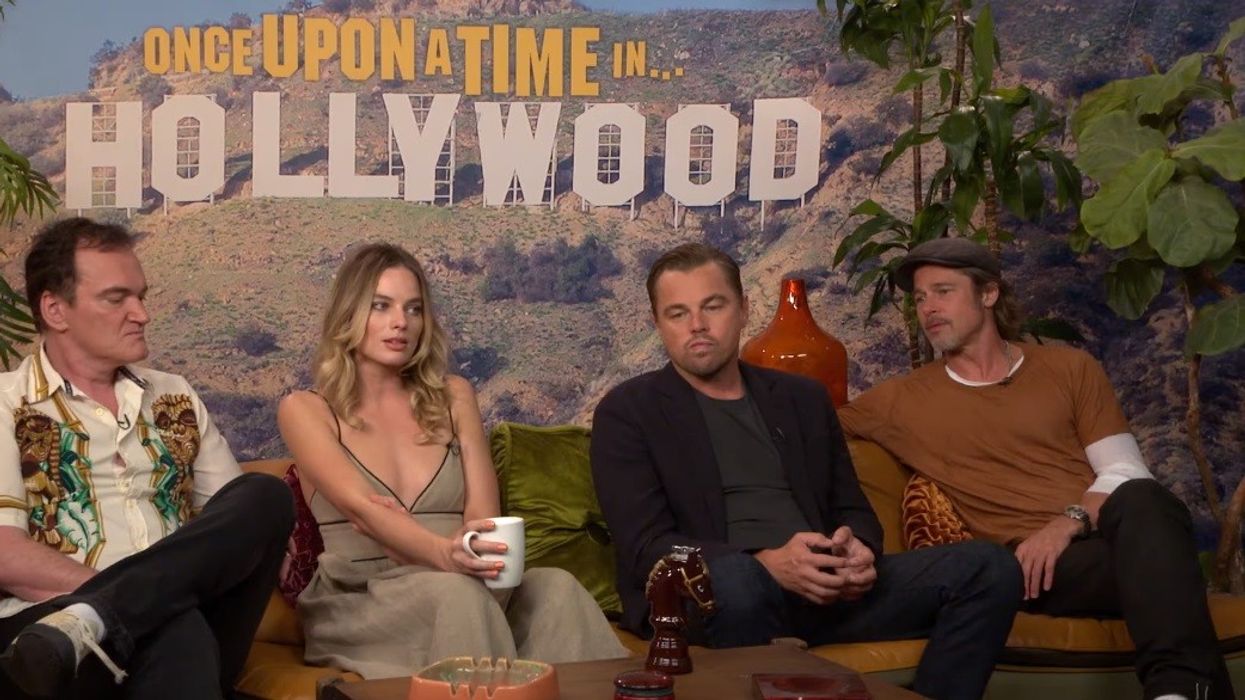Is 'Once Upon a Time...In Hollywood' Tarantino at His Most Meta?
We all know Quentin Tarantino is one of the most meta directors of all time. But is Once Upon a Time...in Hollywood his most meta film to date?
It's easy to pick a Quentin Tarantino film out of a lineup.
Like many auteurs, the films he works on have a certain air about them that sets them apart from the things released in any given year. There's a cadence to the dialogue, editing, and the way the camera moves.
One of the most direct things about Tarantino movies is that they take place in a universe just to the left of our own, a shared universe where everyone is a film buff and smokes Red Apple cigarettes.
So, where does that leave Once Upon a Time...in Hollywood?
As Tarantino builds these worlds out he cannot help but be meta and self-referential. But that all came to a culmination inside Once Upon a Time...in Hollywood, where Tarantino allows all his creative vision to come to a head and points the camera back at himself.
So, what is Tarantino like at his most meta? Watch this video from MUBI and let's talk afterward.
Tarantino at His Most Meta
From the opening frames, Once Upon a Time...in Hollywood is in a constant dialogue with the way we view cinema today. It has homages to the great TV actors Tarantino loved who never made it into movies. And he's taking our knowledge about what we see him do in film and turning it on its head.
Rick Dalton's story is one we've seen Tarantino tackle in real life.
He's the king of taking actors "past their prime" and repurposing them into meaningful roles. Rick is struggling to find that meaning in his own life. By blending actual TV shows with Rick's arc, we get Tarantino both lampooning Rick's reality and building him into our own.
Rick's knowledge of Roman Polanski and Sharon Tate as his famous next-door neighbors pulls our knowledge of these people, too.
This is a movie built around events we know happened...once upon a time.
And since we know Tarantino is a romantic when it comes to these times, we're on the edge of our seats figuring out what he's going to serve.
In many ways, we're like Rick Dalton. Waiting for Tarantino's world to resurrect us, deciding if we'll commit to his movie fully.
As Rick leans into these things...Cliff is the one sticking his neck out.
Reality inside a movie is a prism by which we view the world.
So, what's Cliff's reality? We're not sure. Is he a cold-blooded killer who got away with murdering his wife or just a lonely, dog-loving, guy with a cruel sense of justice?
Cliff is basically a personal assistant and a stuntman. He puts himself in mortal peril for a paycheck, and when he clocks out he does the same for Rick in general.
Cliff is the guy on the roof fixing things, he's the guy at the Spahn Ranch poking around, and the one taking on the gang at Cielo while Rick is in the pool. Cliff is also the guy in the ambulance at the end, headed to the hospital with the police as Rick gets to hang out with Sharon Tate.
Cliff is the guy who actually fights...stardom.
These doubles are thematic through the movie.
Besides Cliff and Rick...let's talk about Margot Robbie's Sharon Tate...and...well...Sharon Tate.
In the movie theater scene, we watch as Robbie as Sharon watches the real Sharon.
This is what we would call a metatextual layer and it's what makes Once Upon a Time...in Hollywood stand out. Since we have a character playing a real person, we get our feelings on that actor, on the real person, and on the real-life events.
This is Tarantino challenging us, making us take our preconceived notions about the person and use them within his story.
Think about how he uses Leo's star power. We know he's a star. His character wants to be a star, but the movie shows someone who's held back. We have to see past Leo the way Rick has to see past the Spaghetti Western roles offered him.
And when we see him acting in formulaic TV, we know he's too talented to be there!
The same goes for Brad Pitt as Cliff.
He's a star kept behind the scenes. We know it's because of the choices he's made in his personal life. While I'm not sure we're meant to deeply analyze Brad's life, I do think we're supposed to wonder what his life would have been if he never broke into stardom with the roles he was given in the 90s.
All this comes together in a Tarantino masterpiece that challenges us to understand him, Hollywood, and what we come to expect from his worlds.
It's one of my favorite movies of the year and probably the decade.
What did you think?
What are some meta-narratives within the movie you think we missed?
Let us know in the comments.
What's next? Learn more about Film Theory!
Basic knowledge of Film Theory could be your ticket to making a compelling argument, a classic film, or winning at Jeopardy. So read on!
Click for more...













